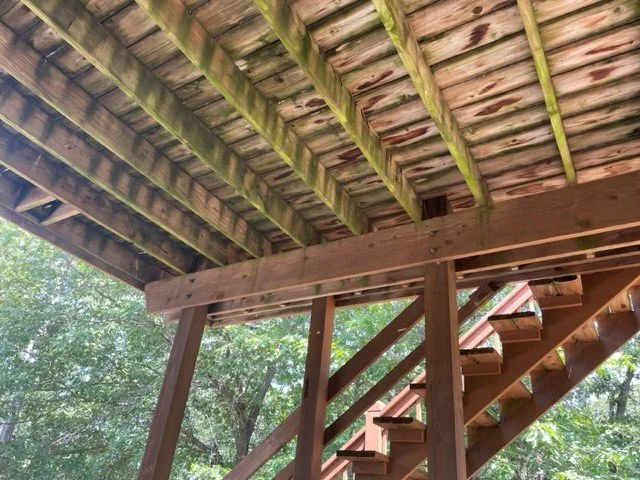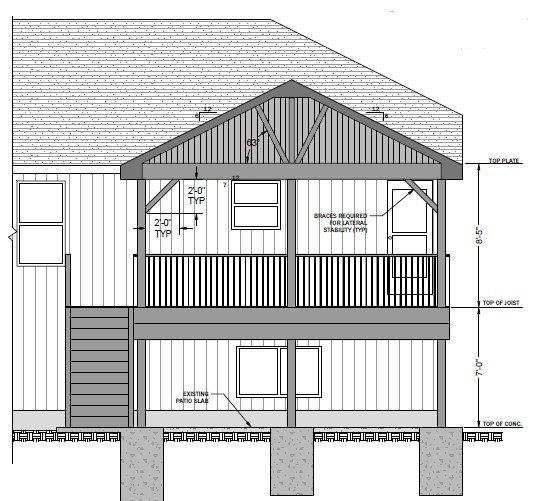Common Deck Issues and How to Address Them
Benefits of Decks
Imagine sitting on your deck with a cool drink in hand, watching the sky transform into a mesmerizing tapestry of colors as the sun dips below the horizon. Your deck is the perfect place for unwinding after a long day or hosting gatherings with family and friends.
A deck addition provides a versatile outdoor space for relaxation, entertainment, and enjoying the beauty of nature. However, like any structure, decks can experience issues that require attention and remediation. In this article, we will explore some of the most common deck issues homeowners encounter and discuss potential solutions to ensure safety and compliance with building codes.
Common Issues and Concerns
To begin with, it's important to have a basic understanding of the International Residential Code, which outlines the requirements for deck construction. This code serves as a vital resource for homeowners and contractors to ensure their decks are built to the necessary standards. If you're unsure about the code or need assistance, consulting a professional, such as Resolve Engineering, can provide valuable guidance.
Improper Connection of Deck Ledgers
One of the most common deck failures is due to improper connection between the deck and the home. This generally occurs due to undersized ledger fasteners or wood deterioration due to improper flashing. The ledger board, which attaches the deck to the house, is a critical component that must be securely fastened to ensure the structural integrity of the deck. The code provides specific guidelines for ledger fasteners, including their size, spacing, and materials. If your deck suffers from undersized or improperly spaced ledger fasteners, it is crucial to address this issue promptly to prevent potential collapse or safety hazards. Seeking professional assistance will ensure the correct installation of your deck ledger according to the code.
Missing or Undersized Footings
Another frequently encountered problem is inadequate footing sizes or missing footings altogether. Footings are designed to provide a stable foundation for the deck and to prevent sinking or settlement in the deck over time. If footings are too small or absent, settlement may occur in the deck leading to various other structural issues. It is important to verify the adequacy of your deck's footings and consult with a professional to determine the necessary modifications or additions required to ensure the footings are sized correctly.
Improper Support Beams
Improper installation or undersized beams are also common deck issues. Beams are load-bearing components that support the weight of the deck joists. If they are not installed correctly or are insufficient in size, the deck may sag or fail to bear the necessary weight, posing a safety risk. Following the code requirements for beam installation and size requirements is crucial. Consulting a local Kansas City professional engineer such as Resolve Engineering can help ensure that your deck's beams are properly installed and meet the necessary specifications.
Overspanned Joists
Inadequate joist span is another concern that can compromise the structural integrity of a deck. Joists are horizontal members that support the deck boards and distribute the load to the beams and ledger. If the span between the beam and the ledger is too large, the deck boards may sag or feel unstable when walked upon. Following the code requirements for joist span and spacing is essential to ensure the safety and longevity of your deck. An engineering professional can assess your deck's joist span and recommend appropriate solutions to address any issues.
Addition of a Roof
If your deck has a roof or plans to add one in the future, it is essential to consider the additional load it introduces. Roofs, pergolas, or awnings can add weight to the deck structure and footings. While the code provides specifications for deck construction, it does not have specific requirements for deck roofs. Therefore, it is crucial to engage a local engineer who can assess the additional load imposed by the roof and provide appropriate engineering plans to ensure the deck remains safe and structurally sound.
Resolve Engineering is a trusted resource that can assist homeowners in the Kansas City and surrounding areas in addressing common deck issues. Whether you need guidance on adhering to the code, help with ledgers, footings, beams, joists, or assessing the impact of a roof on your deck's structure, we can provide expert advice and engineered plans tailored to your specific needs.
While decks offer a relaxing space for outdoor activities and to spend time with family and friends, it is important to be aware of the common issues that can arise. If you need a review of your current deck or engineered plans for a new deck, Resolve Engineering can help. A licensed Professional Engineer will accurately assess and recommend any necessary repairs or modifications to your deck or provide you with a signed and sealed set of drawings to submit for permit and to your contractor to ensure a smooth construction process.
Contact us today at 913-298-3600 or blake@resolveengineering.com to discuss your project further.



